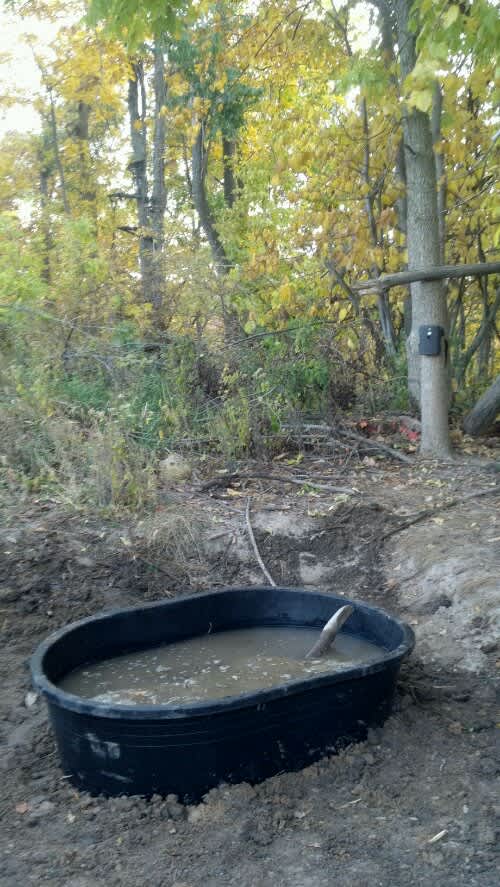Deer Water Hole Improvement 101
Michigan Sportsman 10.01.12

This is the water hole location that started it all for us…at least the importance of water when it comes to evening feeding patterns and all-day rut activity! Starting with shovels and followed by a lot of expansion throughout the years, our first water hole was in need of improvement.
Using the same 110-gallon tanks that have been a huge success in three other locations on the property, our oldest water hole will again be one of our best. During the last several weeks the waterhole would be dry within a week following the addition of close to 100 gallons of water. Our experience over the last few years with various tanks has taught us that by using the 110-gallon tank, that same amount of water can last two months or more depending on temperatures and the amount of rainfall. Last year a new waterhole was installed in May, filled with with 60 gallons of water and it still held an inch of water in late October!
Each of our deer water holes offer incredible stand locations while reinforcing movements between bedding and feeding. Each is also located within a traditional rut cruising area.
During the past couple of years dozens of my clients have used similar containers with similar results. It may take a month or two for the mature bucks to use, but when they do it becomes a highly predictable pattern.
 Think you have enough water already? That’s not the point. Where a water hole is extremely effective is when it is located between a “dry” bedding area and an evening food source. When that situation is created, then that water hole can be one of the most consistent movement patterns for an afternoon hunt. Bedding to water to food source – it’s a pretty cool pattern to take advantage of!
Think you have enough water already? That’s not the point. Where a water hole is extremely effective is when it is located between a “dry” bedding area and an evening food source. When that situation is created, then that water hole can be one of the most consistent movement patterns for an afternoon hunt. Bedding to water to food source – it’s a pretty cool pattern to take advantage of!
The waterhole was “ok” the way that it was, but always featured an inconsistent level of use, mostly subject to the whims of mother nature. But not anymore!
A trip to Tractor Supply Company, $75, and a good friend to help dig it in and you too can create an outstanding water hole. I personally like to place this particular container about a half-foot into the ground, so that a deer does not have to kneel to get to the last several inches. What that also helps me to do is to keep from having to re-fill the tank during critical times of the season because the water level is too low. Instead, any deer can easily reach water while in a standing position, even if the level of water is towards the bottom of the container.
Its important to leave a stick in the container for small rodents to use as an escape bridge, and I also like to add some soil to the water to produce a more natural taste and smell. The stick will also keep the container from cracking during the winter months.
This particular location has offered water a portion of the time for many years. Because this is the same container that has been used at other locations, and because this area has offered water for so long…I am hoping that the local mature bucks will become used to the location quickly! And if they don’t, well, our old waterhole was holding very little water anyways and it was time for an improvement.
By Jeff Sturgis, www.whitetailhabitatsolutions.com


